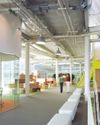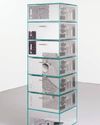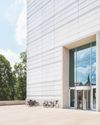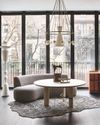Metropolis breaks down the spectrum, revealing how designers grapple with light across scales and typologies.

Transparency
The iconic clear and colored glassworks of Timo Sarpaneva still feel fresh today.
By Tiffany Lambert
For over half a century, until his death in 2006, Finnish artist and designer Timo Sarpaneva exerted a significant influence on Scandinavian design. Marrying the functional and the fanciful, he enthusiastically engaged with such diverse media as cast iron, textiles, and graphics, but was most highly regarded for his glass pieces, which are defined by their sculptural grace and textured or colored surfaces.
Born into a family of blacksmiths, Sarpaneva trained as a graphic designer at the Central School of Industrial Design (later the University of Arts and Design, now a part of Aalto University) but shifted his focus after graduating. His first forays into glassmaking are summed up by his odd but daring glass art object of 1949, a thick, truncated stalk, blossoming at the top, rendered in clear and green glass. This early piece suggests the budding growth of organicism and offers glimpses of the unbridled experimentation in the future.
At just 24, Sarpaneva was hired by Iittala, the iconic Finnish glass manufacturer. Among his first designs for the company was Devil’s Churn (1951), an abstract collection in which supple biomorphic forms were gently incised with perforations, made by cutting through molten glass with scissors. In subsequent works he adapted the steam-blown technique by using wet wooden branches (mostly fallen from apple trees) to produce pockets of air inside the still-hot glass; the results of this unorthodox method are best demonstrated by his clear-glass vases, such as Lansetti II (Lancet II) and Kajakki (Kayak), which were awarded the Grand Prix at the 1954 Milan Triennale. By employing techniques typically reserved for the production of sculpture, Sarpaneva blurred distinctions between art glass and glass for everyday use.
Denne historien er fra April 2019-utgaven av Metropolis Magazine.
Start din 7-dagers gratis prøveperiode på Magzter GOLD for å få tilgang til tusenvis av utvalgte premiumhistorier og 9000+ magasiner og aviser.
Allerede abonnent ? Logg på
Denne historien er fra April 2019-utgaven av Metropolis Magazine.
Start din 7-dagers gratis prøveperiode på Magzter GOLD for å få tilgang til tusenvis av utvalgte premiumhistorier og 9000+ magasiner og aviser.
Allerede abonnent? Logg på

No New Buildings
The energy already embodied in the built environment is a precious unnatural resource. It’s time to start treating it like one.

The Circular Office
Major manufacturers are exploring every avenue to close the loop on workplace furniture.

Signs of Life
Designers, curators, and entrepreneurs are scrambling to make sense of motherhood in a culture that’s often hostile to it.

Interspecies Ethic
In probing the relationship between humans and nature, two major exhibitions question the very foundations of design practice.

Building on Brand
The Bauhaus turned 100 this year, and a crop of museum buildings sprang up for the celebration.

Building for Tomorrow, Today
Radical change in the building industry is desperately needed. And it cannot happen without the building trades.

Strength from Within
Maggie’s Centres, the service-focused cancer support network, eschews clinical design to arm patients in their fight for life.

Next-Level Living
The availability of attractive, hospitality-grade products on the market means everyday consumers can live the high life at home.

Mi Casa, Su Casa
Casa Perfect creates a memorable shopping experience in lavish private homes.

Enter The Culinarium
AvroKO imagines the future of residential amenities—where convenience, comfort, and sustainability meet.